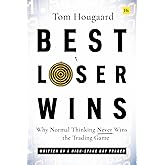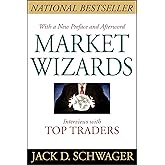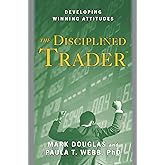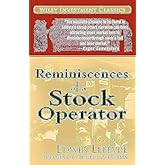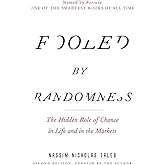Buy new:
$41.57$41.57
FREE delivery January 22 - 23
Ships from: Orion LLC Sold by: Orion LLC
Save with Used - Like New
$11.91$11.91
FREE delivery January 21 - 24
Ships from: ThriftBooks-Atlanta Sold by: ThriftBooks-Atlanta

Download the free Kindle app and start reading Kindle books instantly on your smartphone, tablet, or computer - no Kindle device required.
Read instantly on your browser with Kindle for Web.
Using your mobile phone camera - scan the code below and download the Kindle app.



 Audible sample
Audible sample Follow the authors
OK
What I Learned Losing a Million Dollars Hardcover – January 1, 1994
Purchase options and add-ons
- Print length190 pages
- LanguageEnglish
- PublisherInfrared Pr
- Publication dateJanuary 1, 1994
- Dimensions6.5 x 1 x 9.5 inches
- ISBN-100963579495
- ISBN-13978-0963579492
Book recommendations, author interviews, editors' picks, and more. Read it now.
Frequently bought together

Customers who viewed this item also viewed
Product details
- Publisher : Infrared Pr (January 1, 1994)
- Language : English
- Hardcover : 190 pages
- ISBN-10 : 0963579495
- ISBN-13 : 978-0963579492
- Item Weight : 1.06 pounds
- Dimensions : 6.5 x 1 x 9.5 inches
- Best Sellers Rank: #4,185,659 in Books (See Top 100 in Books)
- #4,709 in Stock Market Investing (Books)
- #8,322 in Decision-Making & Problem Solving
- Customer Reviews:
About the authors

Brendan Moynihan is an editor-at-large for Bloomberg News, where he manages the popular column Chart of the Day and writes about the economy and Wall Street. He has been with the company since 2007 after spending more than twenty years on Wall Street as a trader and risk manager. He is the author of Trading on Expectations (Wiley, 1997) and co-author of What I Learned Losing A Million Dollars (Infrared Press, 1994). He lives in Brentwood, Tennessee, with his wife and two sons, and is currently writing a book on English grammar.

Discover more of the author’s books, see similar authors, read book recommendations and more.
Customer reviews
Customer Reviews, including Product Star Ratings help customers to learn more about the product and decide whether it is the right product for them.
To calculate the overall star rating and percentage breakdown by star, we don’t use a simple average. Instead, our system considers things like how recent a review is and if the reviewer bought the item on Amazon. It also analyzed reviews to verify trustworthiness.
Learn more how customers reviews work on AmazonCustomers say
Customers find the book instructive and practical for learning about investing, gambling, and speculating. They describe it as an easy, enjoyable read with straightforward and honest writing style. The author explores the psychology of loss and provides insights into how to avoid emotional mistakes. Many readers consider the book worth the investment and say it's the best self-help finance book ever. However, some customers feel the approach conflicts with value investing principles.
AI-generated from the text of customer reviews
Customers find the book instructive and practical. It explains the psychology of investing, gambling, and speculating. The author provides insights that are intuitive and easy to understand. They describe it as a great book on business and one of the best written on investing.
"...book progresses, his eyes are opened and he becomes very humble and instructive. My hat's off to this guy. Writing a book about his mistakes...." Read more
"...and errors in depth and analyses how to avoid emotional mistakes, remain objective and stay on plan. Easier said than done...." Read more
"...This book is very unique. The first half is written in a “high information density” style (i.e., you don’t have to read much to get a lot out of it)..." Read more
"...line--I liked this very readable book, and feel it will help me in future investing!" Read more
Customers find the book an enjoyable and easy read. They appreciate the author's life story and find it refreshing to read a book that puts a frame around their personality. The book is described as entertaining and a quick read.
"...Congratulations Mr Paul, Excellent book!!" Read more
"It’s a quick read and the anecdotes make it entertaining, if you can say that about losing over $1.5 Million!..." Read more
"This book provides a great narrative. It is one of the best books I have ever read...." Read more
"...Bottom line--I liked this very readable book, and feel it will help me in future investing!" Read more
Customers find the book straightforward and easy to read. They appreciate the clear language used, which simplifies complicated topics. The author is honest about his emotions and speaks clearly about his shortcomings. Overall, readers find the book lucid, concise, and relevant.
"...of view – the psychological mechanisms exemplified in easy to identify with language explain much of how business and historical arrogance forms,..." Read more
"...describes a process to help the investor avoid losing which is simple to implement...." Read more
"...this book stellar compared to other trading books, is that it is very well written and thorough in it's explanations...." Read more
"...you do not learn anything from it, it is a remarkably entertaing and easy read...." Read more
Customers find the book's psychology insightful. They say it explores the underlying psychology of a loss, analyzes how to avoid emotional mistakes, stay objective, and stay on plan. The book provides good insights into the psychology of a trader and is relatable to everything in life. Readers appreciate the perspective on managing numbers and risk.
"...Then he explores the fallacies and errors in depth and analyses how to avoid emotional mistakes, remain objective and stay on plan...." Read more
"Behavioral economics before the field was truly formed. A nice application of psychology and personal insight. Well worth the read." Read more
"...This is because a lot of their loss-prevention strategies are rooted in basic psychology and the will to stick with it even when their emotions are..." Read more
"...He came across as arrogant and self-absorbed. I forced myself to finish the book, and I have to say. I apologize for my initial opinions on this...." Read more
Customers find the book valuable. They say it's an excellent read for anyone who invests and helps them become more profitable traders. Many reviewers consider it one of the best self-help finance books and one of the best trading books they have ever read.
"...One of the best trading books I've read (over 150 books). If you are smart, you will read this book before you start trading...." Read more
"...and well worth the investment." Read more
"This is a valuable and insightful book...." Read more
"...As this book states, you can make money in any number of ways and many of them opposite from one another...." Read more
Customers enjoy the humor in the book. They find the account humorous and entertaining.
"It’s a quick read and the anecdotes make it entertaining, if you can say that about losing over $1.5 Million!..." Read more
"First part is good and funny. Second part is a little boring. Third part is good, but not funny...." Read more
"Book split into two parts: the first is an entertaining story, the second is the authors reflection on why he lost everything...." Read more
"...The book it both funny and really insightful! The last few chapters about losses delivers the bang for buck!" Read more
Customers have mixed opinions about the story. Some find it interesting and useful, with good lessons from the story. Others feel the first half of the book is repetitive and boring. The author's explanation of his own story is appreciated.
"This book provides a great narrative. It is one of the best books I have ever read...." Read more
"...He then pragmatically examines and dissects the story, distilling lessons about the psychology of loss, the different types of risk activities,..." Read more
"...The second half of the book is much more wordy filler – giving too many examples and overselling the point...." Read more
"First part is good and funny. Second part is a little boring. Third part is good, but not funny...." Read more
Customers find the book's investment strategy inconsistent with value investing principles. They say it's a poor book on trading that oversells its point. The book is focused on trading rather than investment practice, making it boring and trivial to read.
"...book is much more wordy filler – giving too many examples and overselling the point...." Read more
"...And this book represents the other side of the equation - People who lose money...." Read more
"...The early chapters of the book are boring and almost seem trivial. The authors labor about his business that is not really interesting...." Read more
"...The approach simply conflicts with principles of value investing and not even relevant for most part...." Read more
Top reviews from the United States
There was a problem filtering reviews right now. Please try again later.
- Reviewed in the United States on December 30, 2018I started off disliking the 'author' this book. He came across as arrogant and self-absorbed. I forced myself to finish the book, and I have to say. I apologize for my initial opinions on this. This book perfectly depicts a successful trader who has developed the idea he is successful just because he is superior to all others. His intuition is superior to our research and study.
As the book progresses, his eyes are opened and he becomes very humble and instructive. My hat's off to this guy. Writing a book about his mistakes. This is extremely rare. Most financial writers are selling a service or their superiority (and mostly your inferiority) I can see a little of me 25 years ago.
I know a few traders where I can see this very same thing happening. It's painful to watch. But, they will not accept any input from the 'less intelligent' people.
One of the best trading books I've read (over 150 books). If you are smart, you will read this book before you start trading. This book should be required reading in any financial training institution. Online trading schools should give this book to all their students.
Congratulations Mr Paul, Excellent book!!
- Reviewed in the United States on September 6, 2024It’s a quick read and the anecdotes make it entertaining, if you can say that about losing over $1.5 Million!
The first portion of the book allows you to related to the main character and probably identify with some of the errors you have commited yourself. Then he explores the fallacies and errors in depth and analyses how to avoid emotional mistakes, remain objective and stay on plan. Easier said than done.
In the end one will be smarter, if not wiser, when engaging in a continuous decision making process like the markets.
- Reviewed in the United States on October 19, 2014Avoiding abstract psychological explanations, the book gives down to earth examples of how success leads to overconfidence, which leads to obnoxious behavior, which then (often but not always) leads to failure. Although written from an investment point of view – the psychological mechanisms exemplified in easy to identify with language explain much of how business and historical arrogance forms, and are applicable from Henry Ford to Lee at Gettysburg and beyond.
One of the profound conclusions introduced early on is that there are many contradictory ways of making money – but only one way that the ultimately successful keep from losing money; and that is to not let your ego get hung up in your investments and to cut your losses beyond a certain point. The authors own personal sequence of getting drawn in are detailed in ways we all can empathize with, and Johnson in Vietnam is then paralled as a broader example.
Roughly the first half of the book is well thought out and succinct. The second half of the book is much more wordy filler – giving too many examples and overselling the point. Once I realized the author didn’t have much more to say, I found myself skimming over the latter half of the book and onto the conclusion.
This book is very unique. The first half is written in a “high information density” style (i.e., you don’t have to read much to get a lot out of it), and well worth the investment.
- Reviewed in the United States on March 1, 2024The initial portion of the book describes the history of one of the authors, including the mistakes that he had made. Although the writing was a little rough in places, there was a lot that I could identify with.
Then, it got more into theory. I loved the chapter that described the difference between speculators, investors, gamblers and bettors. Once again, I could identify with times that I had claimed to be "investing" but was really "gambling."
Where I thought the book fell down a bit was when it came time to talk about solutions. I agree that one needs a plan, but there were very few suggestions as to how to develop such a plan. Hints were dropped as far as "exit strategy" and stop-loss limits, but that's a very complex topic. If you set your stops too tight, you'll always be stopped out. If you set them too loosely, you'll increase your risk.
For example, when dealing with very volatile securities like penny stocks, a tight stop is pretty much worthless.
By the way, the original edition dated back to the late 90's, and it was a little bit humorous to see that some of the companies that he extolled for good management didn't survive the 2001 crash, and others sank without a trace in 2008. On the other hand, other managers that he was a bit disdainful of (for example, Steve Jobs) wound up being stupendous successes.
Top reviews from other countries
 Amazon CustomerReviewed in Mexico on November 22, 2024
Amazon CustomerReviewed in Mexico on November 22, 20243.0 out of 5 stars What I learnt loosing 20 dollars
I bought this book because Taleb recommended it on his book Antifragile. This book should be called “What I learned loosing 20 dollars buying this book”, and the conclusion is not to follow blindfolded recommendations even if it comes from one of your favorite writers. In a nutshell it is about a guy who’s ego was so huge he preferred to risk all his money before admitting he was wrong.
-
 Simone GuidiReviewed in Italy on September 12, 2024
Simone GuidiReviewed in Italy on September 12, 20245.0 out of 5 stars Libro in inglese facile
Il libro è unico nel suo genere, io non sono un grande esperto di lingua inglese, ma comunque con l'aiuto del traduttore e molta pazienza sono riuscito a leggere il libro.
 Nicos KyriacouReviewed in Germany on December 24, 2023
Nicos KyriacouReviewed in Germany on December 24, 20235.0 out of 5 stars v good quality for used
v good quality for used
 PapitoReviewed in France on June 21, 2023
PapitoReviewed in France on June 21, 20235.0 out of 5 stars FIABLE
TOP
-
 Caio PereiraReviewed in Brazil on July 9, 2020
Caio PereiraReviewed in Brazil on July 9, 20205.0 out of 5 stars Grandes ensinamentos! Muito bom!
O livro "What I Learned Losing A Milllion Dollars" foi escrito por Jim Paul e Brendan Moynihan e conta a história, a ascenção e a derrocada de Jim no universo dos investimentos.
Jim conta de forma bastante divertida como conseguiu crescer na carreira, de trader profissional e como - em um único golpe - perdeu todo o dinheiro que havia acumulado durante anos: cerca de um milhão de dólares.
Diferente de muitos outros livros sobre investimentos e mercado financeiro, esse livro fala sobre o fracasso. Jim conta que existem muitas formas de ganhar dinheiro no mercado financeiro ou no mundo dos negócios, porém são poucas as formas de se perder dinheiro. E o fator psicológico é o elemento-chave que desencadeia uma série de perdas e fracassos.
O grande erro está em personalizar as perdas. Tratar uma decisão de investimento como uma aposta ou um jogo. Muitas pessoas entram em investimentos buscando estarem certas. Isso é um grande erro. O fato de um ativo se valorizar ou desvalorizar não deve ser relacionado a um acerto ou um erro. É apenas um fato. Uma vez que o encaramos como um erro, estamos personalizando a perda. Jogando contra nossa autoestima.
Além disso, existe o famoso "efeito manada". Jim conta que não é preciso estar presente em um grupo para começar a demonstrar os sintomas de um efeito manada. Uma pessoa sozinha pode se deixar levar pelas emoções e começar a agir por impulso, colocando em risco seu patrimônio. É provável que essa pessoa até passe pelos 5 estágios da perspectiva da morte: negação, raiva, barganha, depressão e aceitação.
Não tem tradução, mas a leitura em inglês é bem fácil e gostosa!
Recomendo a todos que queiram tomar melhores decisões nos investimentos, nos negócios e na vida!
Show!







